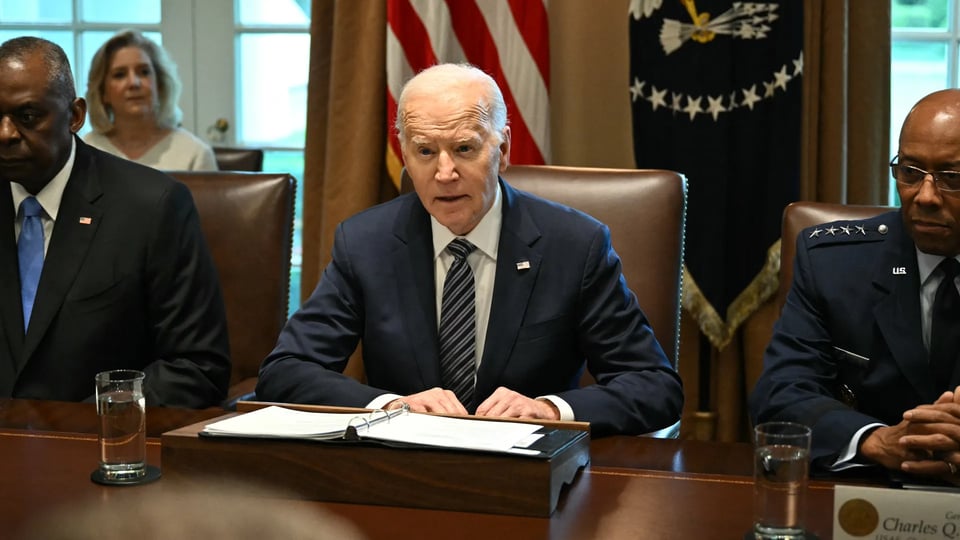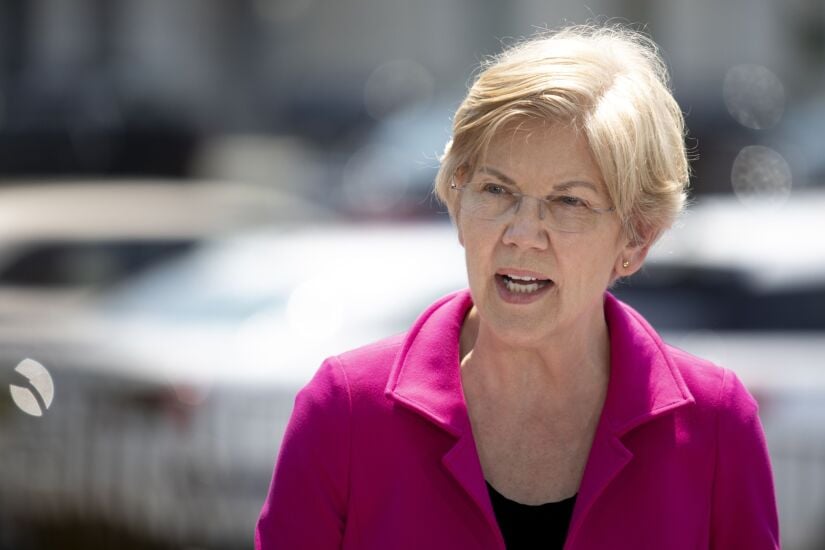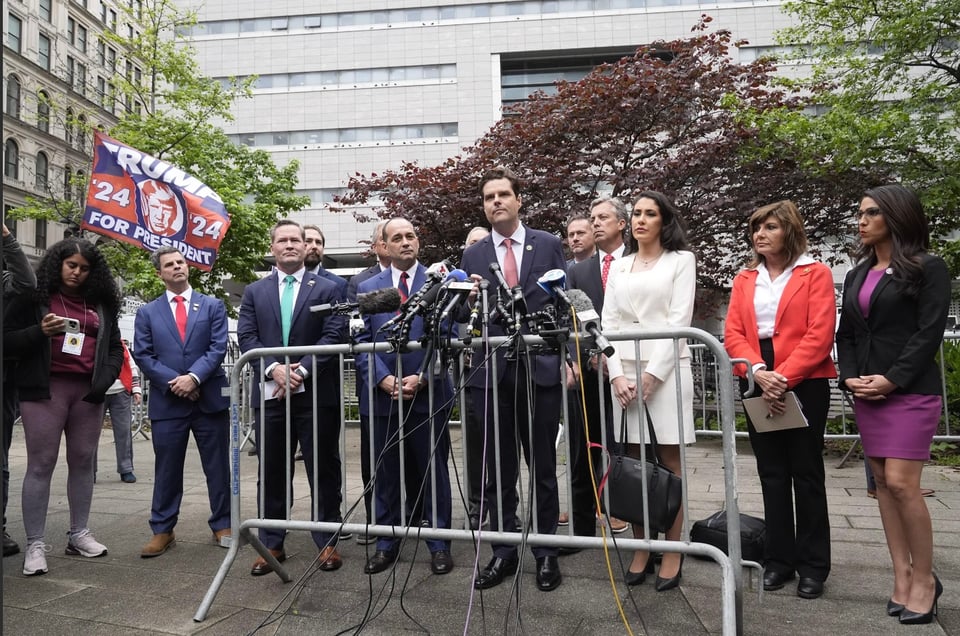Friday, May 17, 2024. Annette’s News Roundup.
I think the Roundup makes people feel not so alone.
To read an article excerpted in this Roundup, click on its blue title. Each “blue” article is hyperlinked so you can read the whole article.
Please feel free to share.
Invite at least one other person to subscribe today! Here 👇 is the link to share for others to subscribe. https://buttondown.email/AnnettesNewsRoundup
Remember: when you share the Roundup, you are fighting Fascism and helping to bring about a Democratic victory in 2024.
_________________________________________________
Joe is always busy.
President Biden attended the National Peace Officers’ Memorial Service to honor over 200 heroic women and men across our law enforcement community who made the ultimate sacrifice.
— The White House (@WhiteHouse) May 16, 2024
There is no greater responsibility of government than ensuring the safety of the American people… pic.twitter.com/2qiD6E23JJ
Biden shields audio of special counsel interview from House GOP.

President Biden has asserted executive privilege to deny House Republicans audio recordings of his interview with special counsel Robert Hur, the Justice Department revealed on Thursday.
Why it matters: The disclosure comes just before a pair of House committees plan to vote on holding Attorney General Merrick Garland in contempt of Congress for refusing to turn over the audio.
What they're saying: "I write to inform you that the President has asserted executive privilege over the requested audio recordings," Assistant Attorney General Carlos Felipe Uriarte wrote in a letter obtained by Axios.
In the letter, addressed to House Judiciary Committee Chair Jim Jordan (R-Ohio) and Oversight Committee Chair James Comer (R-Ky.), Uriarte wrote that the DOJ has made "substantial efforts" to comply with their probe.
That included providing Hur's report, transcripts of the special counsel's interviews and several other documents related to the probe.
But Garland, he wrote, "must draw a line that safeguards the Department from improper political influence and protects our principles, our law enforcement work, and the people who carry out that work."
Zoom in: Garland, in a letter to Biden on Wednesday recommending he assert executive privilege, wrote that releasing the audio would "damage future law enforcement efforts."
He argued that House Republicans have not given a compelling reason to override those concerns.
The backdrop: Hur, who investigated Biden's handling of classified documents from his time as his vice president, detailed Biden's memory lapses in his final report.
In outlining his decision not to prosecute Biden, Hur wrote that Biden would likely come to a jury as a "sympathetic, well-meaning, elderly man with a poor memory."
Republicans moved swiftly to open a probe and try to make public as much material from Hur's probe as possible, arguing that the public has a right to the information.
Between the lines: In a separate letter to Comer and Jordan, White House attorney Edward Siskel wrote, "The absence of a legitimate need for the audio recordings lays bare your likely goal—to chop them up, distort them, and use them for partisan political purposes."
"Demanding such sensitive and constitutionally-protected law enforcement materials from the Executive Branch because you want to manipulate them for potential political gain is inappropriate," he added.
Spokespeople for Jordan and Comer did not immediately respond to requests for comment. (Axios).
https://x.com/cnnbrk/status/1790839812938703196?s=61&t=I_Od53CbnPTsbLcD0baXPg
The Dow just crossed 40,000 for the first time.
NEW YORK (AP) — The Dow Jones Industrial Average just topped 40,000 for the first time, the latest pop in what’s been a surprisingly good year for Wall Street.
But just like New Year’s represents an arbitrary point in time in the Earth’s revolution around the sun, such milestones for the Dow don’t mean that much inherently.
For one, with just 30 companies, the Dow represents a tiny slice of Corporate America. For another, almost no one’s 401(k) account sees its performance depend on the Dow, which has become more of a relic used for historical comparisons.
SO WHY CARE ABOUT THE DOW?
Because it’s so old, it has a longer track record than other measures of the market.(Associated Press).
_________________________________________________
Kamala is always busy.
I learned many lessons from my grandfather during my childhood visits to India — including what a democracy can and should be.
— Vice President Kamala Harris (@VP) May 16, 2024
I was proud to join the leaders of @IA_Impact today to uplift their work empowering Indian American leaders and fighting for our democracy. pic.twitter.com/SgGCRPw0Zg
Welcome to the league, Valkyries! Glad to see you representing the Bay Area in the WNBA. https://t.co/peFxIc8TEr
— Vice President Kamala Harris (@VP) May 14, 2024

Harris accepts debate invite to face off with Trump’s VP pick.
WASHINGTON (AP) — Vice President Kamala Harris has accepted an invitation from CBS News to debate former President Donald Trump’s vice presidential pick this summer, the Biden campaign said Thursday, as the Republican said he might wait until his party’s convention in July to announce his selection.
Harris’ team told the network she would debate in-studio on Tuesday, July 23, or Tuesday, August 13, and encouraged the Trump campaign to agree to one of the dates for his eventual vice presidential pick. The Trump campaign didn’t immediately comment on the debate invite.
Trump, in an interview with TMJ4 taped from New York, said there was “a pretty good chance” he would announce his vice presidential pick at the GOP convention in Milwaukee, which begins on July 15, rather than before.
“I don’t say anything is 100%, but you’re getting pretty close,” he was quoted saying. “I’ll be doing it in Milwaukee. We’re going to have a great time.”
The announcement comes after President Joe Biden and Trump agreed to two debates this summer to be hosted by CNN on June 27 and ABC on Sept. 10.
The debates are not expected to take place before live audiences — a key demand of the Biden campaign that contributed to its decision to ditch the debates organized by the nonpartisan Commission on Presidential Debates, which had organized every presidential and vice presidential general election debate since 1988.
_________________________________________________
The Supreme Court today.

A post from the pro-Trump site Patriots.win encouraging Trump supporters who couldn’t make it to Washington on January 6 to fly their flags upside down to show their support for Trump.
At Justice Alito's House, a 'Stop the Steal' Symbol on Display.
An upside-down flag, adopted by Trump supporters contesting the Biden victory, flew over the justice's front lawn as the Supreme Court was considering an election case.
When I saw this headline in the New York Times late Thursday, a lot of different things ran through my mind. First, I wondered who had gotten through security to rig the flag at the Justice’s home. Then, as I read the story's opening lines, I figured the photo had to be a deep fake.
Here’s what I did not anticipate: that in January of 2017—for several days around January 17th, to be precise, both after the insurrection on the sixth and while the Supreme Court was still considering whether to hear an election-related case—the inverted flag associated with the “Stop the Steal” movement was flying on a flagpole on Justice Alito’s lawn.

Photo from the New York Times showing the flag flying at Justice Alito’s home.
We know it’s true because Justice Alito blamed his wife when asked. As though a sitting Supreme Court Justice, upon pulling up to his home and seeing the flag, wouldn’t immediately take it down and say, “Honey, I understand your feelings, but as a Justice on the United States Supreme Court, I must avoid even the appearance of impropriety, and that flag conveys a political sentiment that is an affront to the rule of law I’m sworn to uphold, especially after rioters carrying it swarmed the Capitol a week and a half ago.”
The Times reported that Alito emailed the following statement to them when asked for comment: “I had no involvement whatsoever in the flying of the flag. It was briefly placed by Mrs. Alito in response to a neighbor’s use of objectionable and personally insulting language on yard signs.”
I have spent a good bit of time in my life around Judges. My Father-in-Law was a federal judge, my Husband was a state court judge, and I have a number of close friends on the bench. I am certain that none of their spouses or other family members would have even considered placing a political symbol like this in their front yard because they would have understood the rules, just like I did. And the rules are, you don’t do that. At the time the Alito’s flew the flag in front of their house, the Court was deciding whether to hear a vote-counting challenge from Pennsylvania. The majority said no, but Justice Alito, joined by Thomas, dissented. They wanted the Court to take the case, whose theme, in brief, was that the Pennsylvania election had been stolen—stop the steal.
You can hardly blame the folks who saw the flag flying at the Alito’s home and decided it had to be brought to the Court’s attention. Surprisingly, it’s taken this long to become public. The Times reported that the half-dozen or so neighbors who were aware of it asked to remain anonymous because they “feared reprisal.” Let that sink in as we contemplate what a second Trump term in office might look like.
The ethics rules that apply to all of the lower federal court judges in this country are similar to those I’m used to as a former DOJ employee. No political signs in front of your house, not bumper stickers on your car. It’s not complicated. If you’re committed to serving the people and ensuring they have confidence in the fair administration of justice, you just don’t. But Sam Alito did.
Justice Alito seems to have forgotten, or perhaps he’s just flagrantly ignoring, the fundamental truth of this Republic, which is that judges are not meant to be above the law. If anything, they must hold themselves to a higher standard in service to ensure that American justice holds the high standards of the Founding Fathers to whom Justice Alito frequently pays lip service.
In a different era, Justice Alito, if not resigning from the Court over such a serious breach of ethics would, at a minimum, recuse himself from two cases that are currently pending before the Court: the presidential immunity case and the case deciding whether the statute that criminalizes interference with an official proceeding applies to January 6. Will there be any consequences in Alito’s case? Doubtful. Will Alito continue to sit on those two cases alongside Clarence Thomas, who has his own ethical issues? Undoubtedly.
Much as Trump eroded public trust in our essential institutions, two Justices are stripping public confidence in the nation’s highest court. Permitting Donald Trump to name any more justices to this Court would be a blow the nation could not withstand. We are entitled to judges and justices who take their oaths of office seriously.
Imagine if it came to light that Justice Sotomayor had an Antifa bumper sticker on her car or Justice Jackson had a “Dark Brandon” sign in her front yard. What would the fallout look like?
This is important, if belated, news particularly in the context of earlier reports about ethical lapses by members of the Supreme Court. It deserves a lengthy turn in the news cycle. There are a lot of weighty issues on the ballot in November. We do ourselves and our future a disservice if we do not include the Supreme Court as one of them.(Joyce Vance, Civil Discourse).
_________________________________________________
Supreme Court upholds Consumer Financial Protection Bureau in major win for Biden, Democrats.

Senator Elizabeth Warren led the founding of the CFPB after the 2008 financial crisis. It has been a nemesis to Republicans ever since.
Payday loan companies had alleged the way CFPB is funded was unconstitutional.
The Supreme Court on Thursday upheld the Consumer Financial Protection Bureau and how Congress decided to fund the agency, rejecting a constitutional challenge by the banking industry and preserving a broad set of regulations that govern everything from credit cards to personal loans and home mortgages.
The court's decision, a 7-2 ruling with Justices Samuel Alito and Neil Gorsuch dissenting, is a major victory for the Biden administration and Democrats who have championed the independent agency as a bulwark against corporate financial abuses after the 2008 crash.
Conservatives have spent years attacking the CFPB as a source of undue and costly government regulation. This case centered on a group of payday lenders that alleged the indirect funding of the CFPB through the Federal Reserve System rather than annual congressional appropriations violated the Constitution's Appropriations Clause, which says no taxpayer funds should be spent without "appropriations made by law."
Justice Clarence Thomas, who wrote the opinion, said while the associations made several arguments for why the agency's funding mechanism was constitutionally unsound, "none is persuasive."
"Under the Appropriations Clause, an appropriation is simply a law that authorizes expenditures from a specified source of public money for designated purposes," Thomas wrote. "The statute that provides the Bureau's funding meets these requirements. We therefore conclude that the Bureau's funding mechanism does not violate the Appropriations Clause."
In a statement to ABC News, a CFPB spokesperson called the Supreme Court's decision "a resounding victory for American families and honest businesses alike."
"For years, lawbreaking companies and Wall Street lobbyists have been scheming to defund essential consumer protection enforcement," the spokesperson said. "The Supreme Court has rejected their radical theory that would have devastated the American financial markets. The Court repudiated the arguments of the payday loan lobby and made it clear that the CFPB is here to stay."
The court's opinion by Thomas was joined by Chief Justice John Roberts and Justices Sonia Sotomayor, Elena Kagan, Amy Coney Barrett and Ketanji Brown Jackson.
Justice Kagan wrote in a concurring opinion the bureau's funding scheme, "if transplanted back to the late-18th century, would have fit right in."
Justice Alito, in a dissent joined by Gorsuch, blasted the majority's interpretation as creating a loophole that would allow Congress to create agencies that "spend public funds in perpetuity" without direct oversight by Congress.
"The Framers would be shocked, even horrified, by this scheme," Alito wrote.
"In sum, centuries of historical practice show that the Appropriations Clause demands legislative control over the source and disposition of the money used to finance Government operations and projects," he wrote. (ABC News).
_________________________________________________
What Republicans value was clear at the Court in New York City today.

House Republicans ditch their day jobs to stand with Trump, while legislating languishes.
Leaving Washington behind, prominent far-right House Republicans who have repeatedly thrown this Congress into chaos showed up Thursday at Donald Trump’s hush money trial to do what they do best.
They stood outside Trump Tower filming their support for the indicted former president. They filed into the Manhattan courthouse “standing back and standing by,” as Rep. Matt Gaetz put it — invoking Trump’s call to the extremist Proud Boys. They were admonished to put down their cell phones.
And the House Republicans commandeered the spotlight — much like House Speaker Mike Johnson did earlier in the week — to rant against what they called the “kangaroo court” and the “political persecution” of Trump, as their day jobs waited for their return.
“President Trump is not going anywhere,” said Rep. Lauren Boebert, R-Colo., as hecklers interrupted.
“And we are not going anywhere either. We are here to stand with him.”
The split-screen scene between New York and D.C. provided one of the more vivid examples yet of how Republicans have tossed aside the de rigueur tasks of governing in favor of the engineered spectacle of grievance, performance and outrage that powers Trump-era American politics.
As much of Congress stalled out yet again, unable to legislate through the country’s challenges, the Republicans chose to spend the day going viral.
The excursion was all the more remarkable because it comes as House Republicans were focused Thursday on moving to hold Attorney General Merrick Garland in contempt of Congress — part of a broader campaign attack on President Joe Biden.
The House’s Oversight and Judiciary Committee Republicans are demanding the Justice Department turn over evidence in the classified documents case against Biden, including an audio interview that is potentially embarrassing to the president as he stumbles through some answers. The Judiciary panel soldiered on Thursday, while the Oversight committee punted its hearing to evening, once lawmakers return.
Rep. Marjorie Taylor Greene, perhaps the most outspoken of Trump’s allies who joined him in New York when he was first charged in the case, lambasted her GOP colleagues for dashing to Manhattan when she said they should be back in Washington doing congressional business.
“I’m here doing my job,” Greene said on the eve of the trip.
Greene particularly criticized Johnson, the speaker she tried to oust, for “running up” to New York when she is pushing him toward her next big project, dismantling Special Counsel Jack Smith’s office and its federal indictments against Trump, including for trying to overturn the 2020 election in the run-up to the Jan. 6, 2021, Capitol attack.
It all unfolds as Congress is on record as being among the most unproductive in recent times, with few legislative accomplishments or bills passed into law.
Republicans swept to House majority control in 2023, but became quickly consumed by infighting as traditional conservatives were pushed aside by Trump’s national populist Make America Great Again movement. They ousted their own leader, then-Speaker Kevin McCarthy, derailed priority bills and left Johnson forced to rely on help from Democrats to stay in power, an unheard of scenario.
“The extreme MAGA Republicans have brought nothing but chaos, dysfunction and extremism to the Congress from the very beginning,” said Rep. Hakeem Jeffries of New York, the Democratic leader. “And they cannot point to a single thing that they’ve been able to do on their own to deliver real results, to solve problems for hardworking American taxpayers.”
“Get a job,” the Democratic Congressional Campaign Committee posted on social media.
Outside the courthouse, the dozen or so Republican lawmakers didn’t dress the same, as others did with matching dark suits and Trump-styled red ties earlier in the week, but still formed a unified front for Trump.
“We’re watching the persecution of a patriot,” said Rep. Diana Harshbarger, R-Tenn. “What a price to be a patriot President Trump has paid.”
Gaetz called it the “Mr. Potato Head doll of crimes” where the prosecutors had to “stick together a bunch of things” to make a case.
While some like Gaetz are among Trump’s biggest backers in Congress, others are working quickly to burnish their credentials with the MAGA movement that now defines the Republican Party for their own political survival.
The chairman of the House Freedom Caucus, Rep. Bob Good, R-Va., had been late to endorse Trump, and now faces a difficult primary next month. His Trump-aligned challenger, Republican John McGuire, was able to ride with Good and the other lawmakers in Trump’s motorcade to the courthouse.
“We’re here to have his back,” Good said of Trump. “We’re here to defend him and to tell the truth about this travesty of justice, this political persecution, this election interference, this rigging of elections.”
Rep. Ralph Norman, R-S.C., who had been a supporter of his home state presidential contender Nikki Haley, derided the “kangaroo court” prosecuting Trump.
Arizona Rep. Eli Crane said Democrats are prosecuting Trump because “they can’t beat him” at the ballot box in November.
Crane said he and other Republicans are fighting to “Make America Great Again,” which after the afternoon of heckling, drew a round of cheers.
By day’s end, they were back at the Capitol, several of them recounting their visit in a series of late-evening floor speeches, all caught on the cameras, before they finished up for the night, and closed out the House. (Associated Press).
_________________________________________________
Broadway is booming, and expecting the bust.
The finances make no sense, but the shows this season are terrific.
So far I say - Run, don’t walk, to see Suffs, Mother Play, Hell’s Kitchen, Water for Elephants, Appropriate.
Ice Cream, no matter how sweet, melts quickly too.
You will be happy!
We’ve Hit Peak Theater. Nobody knows how to succeed on Broadway anymore.

One of the last premiere parties of the Broadway season felt a little on the nose. The Great Gatsby, a ballad-belting, pyrotechnic glow-up of F. Scott Fitzgerald’s American tragedy with two onstage cars and a budget approaching $25 million, celebrated its official opening on April 25, the night of the Tony-nominations deadline, with an after-party at Tavern on the Green. The theme was the Roaring ’20s — the louche decade of easy money that preceded the Great Depression.
Producers in newsboy caps raised their coupe glasses to actors in feathered flapper fits. They were not necessarily in the mood to talk about the specter haunting the ball. Spring 2024 saw a frenzy of new shows opening (21 since January) in the face of two formidable obstacles: costs that have nearly doubled over a decade and an audience almost 20 percent smaller than it was pre-pandemic. Yet Broadway was partying on, stuffing 12 premieres into the nine days before the Tony deadline. “It’s like the planes lining up on the tarmac at La Guardia in bad weather,” as one publicist put it.
The weather certainly isn’t balmy. Two spring shows have already closed: Days of Wine and Roses, a musical of love and alcoholism that ran for two months, and Lempicka, the story of a little-known Polish decorative painter that shed thousands of dollars a week until its low Tony haul sealed its fate. There is always a cull in June, but with sky-high operating costs, an unusually high number of shows are on the bubble. Six new musicals are currently less than 90 percent full; many of them are unlikely to make it through the summer. The low survival rate means theaters are churning through productions with no obvious candidates for the kind of long runs that sustained Broadway in its pre-pandemic boom. Some producers predict a drastic correction with theaters sitting empty for months for the first time since the 1980s.
A couple hours into the party, Cory Pattak, Gatsby’s lighting designer, sidled up to a finger-sandwich station. “And with that,” he shouted over to two tech-production managers, “the season that we thought would never end … has ended!” He debriefed us on the show’s chaotic, last-minute transfer from New Jersey.
Gatsby landed the grand Art Deco Broadway Theatre only because another show, David Byrne’s Imelda Marcos musical Here Lies Love, failed to find an audience and abruptly closed after four months, unable to recover the $22 million investors poured into it. Pattak and other techs, scrambling to beat a rival Gatsby musical to Broadway, were tasked with building a set in five weeks versus the usual 18. And that’s nothing compared with what Illinoisehad to do: The Sufjan Stevens dance musical dropped in so late in the season, replacing a failed Spamalot revival in a matter of days, that it opened (the day before Gatsby) without previews while actors were still rehearsing. “When a theater opens up and they offer it to you,” Pattak explained, “you take it.”
This round-robin of shows, developed in better days and slowed by COVID, has been shuffling at an accelerating pace. Theater owners, eager to keep the lights on, have been plucking them up one after the other. A Huey Lewis jukebox musical? Why not. Randomly timed revivals of Tommy and The Wiz? Sure. A Hamilton-lite revue of women’s suffrage? Don’t mind if we do. And producers, pressed to unload shows before they get stale, are not in a position to sit out the season.
As the jazz age attests, bubbles can be fun. More cast and crew are working more than ever and getting paid better for it. The variety of shows — indie-rock dramas, an R&B jukebox musical, the darkest Cabaret you’ll ever see — has hard-core fans excited. But if you’re an investor, you’re watching the whole spectacle through your fingers. In a season when the biggest musical hit is Merrily We Roll Along, Stephen Sondheim’s most famous flop, and the hottest play, Stereophonic, is just about breaking even, anything might work and anything might fail. Call it Peak Theater — the best and worst time to open on Broadway.
Nearly 30 years ago, the big, bloated musical everyone was talking about was Titanic, produced for the then-astronomical sum of $10 million. Its former star, Brian d’Arcy James, remembers eavesdropping on the crew. “They said, ‘This show has got 18 pounds of sausage in a two-pound bag,’” said James, who starred in Days of Wine and Roses, which closed at the end of March. “And that’s kind of what this season feels like right now.”
The actor, who was making the red-carpet rounds campaigning for his fifth Tony nomination (which he would earn), looked over at a modest step-and-repeat outside the Ethel Barrymore Theatre for Peter Morgan’s play Patriots.It was 1 p.m. on a blustery Monday, when Broadway shows are usually dark. “It’s a Passover special,” publicist Jim Byk explained with a tight grin. The evening holiday was only one reason for the lunchtime red carpet — three of the last four days of Tony-deadline week had two openings apiece, and The Heart of Rock and Roll would open in a few hours.
Patriots carries a timely premise: Michael Stuhlbarg plays a Russian oligarch who engineered the rise of Vladimir Putin. But it owes its Broadway transfer from London, which critics judged to be premature, to a TV oligarch. Morgan created the Netflix hit The Crown, and the streamer is co-producing, hoping to develop Patriots for the screen. Netflix co-CEO Ted Sarandos also walked the red carpet. “My attraction to all this goes back to Norman Lear,” he told me. The legendary showrunner plucked all his best talent from the theater. Broadway’s current reliance on spectacle musicals in search of big crowds, he says, “might be at the cost of drama” — meaning straight plays with subtle acting. “Which is not great.”
It’s a noble sentiment, except that Netflix played a role in Broadway’s current predicament. When COVID shuttered midtown for a year, would-be theatergoers turned to their Rokus. Broadway came back, but it was transformed. Hybrid work meant fewer commuters catching a show after a day in the office; fear of crime (rational or not) didn’t help. The resulting drop in demand has already lasted longer than the dips Broadway saw after 9/11 and the Great Recession. Audiences are down 17 percent since the boom season of 2018–19 with older suburbanites accounting for most of the falloff. “The drop was at 50-plus,” says Damian Bazadona, president of the Situation Group, which recently polled 1,700 Broadway-ticket buyers. Other demographics held steady.
Is that why The Heart of Rock and Roll, a jukebox musical centered on “Hip to Be Square” Huey Lewis, has been so anemic at the box office despite surprisingly good reviews? Is the missing fifth of suburbanites responsible for the fact that, an hour before Monday’s opening-night performance, seats were available at the TKTS booth for 40 percent off?
Rock and Roll is not the only opening-night show at which I found theatergoers with discounted last-minute tickets. When I tell Rocco Landesman, a producer who once owned five houses through Jujamcyn Theaters, about these half-price openings, all he says is, “Wow. That’s usually not a good indicator.” In early May, even the big hits had plenty of seats available in June. Advance sales can sustain a show through the slow summer months (and earn interest). But now audiences are seeing fewer shows and buying tickets much closer to showtime, says producer Rachel Sussman, who developed Suffs, a musical about the women’s-rights movement that’s currently treading water. “And we therefore have had to recalibrate how we forecast.”
Producing on Broadway, where roughly 80 percent of shows fail to recoup, has always been a leap of faith. Yet the leaps behind this year’s shows were mostly made before COVID. The Theater District was booming when the pandemic hit, capping a ten-year run in which attendance rose 25 percent and grosses nearly doubled. It was easier then to believe a mantra that has been recited to me several times, though not always in earnest: If you build it, they will come.
Rebuilding it in 2024 is more like restarting a fire: You need fresh kindling and a spark. You need a show that absolutely everyone wants to see. “Hamilton rose all boats,” says producer John Johnson. “You couldn’t get into that show for months and months, and it drew people to Broadway,” where they could buy a ticket for Kinky Boots or take a flier on Fun Home.
Since the pandemic, no shows seem to be a candidate for canonical status — or even a Kinky Boots–length run. Before the Tony nominations on April 30, no one had much of a clue which of Broadway’s 15 new musicals would break through. Hell’s Kitchen, the Alicia Keys catalogue musical, earned 13 nominations; The Outsiders was close behind with 12. Yet Tonys no longer guarantee solvency. It used to be that if a show won Best Musical, it would earn its money back. Moulin Rouge! The Musical, the last winner to open before the pandemic, ultimately reopened and recouped. The next two winners, A Strange Loop and Kimberly Akimbo, failed to break even before closing. That hadn’t happened since 2002.
MJ, the Michael Jackson musical, is the closest we’ve come to a post-pandemic hit. And this season, Merrily We Roll Along recouped its $12 million cost after only six months. Producer Oliver Roth, who this season backed Merrily, An Enemy of the People, and Lempicka, holds up the Sondheim revival, starring Daniel Radcliffe, as a best-case scenario. “Franchises and stars sell,” he says, “and anything else has a really tough time.” Enemy has Jeremy Strong; Sweeney Todd opened last year with Josh Groban (and Sondheim again). Both are rare post-pandemic success stories.
Another road to recoupment is event theater — the Broadway analogue to the $5,000 Taylor Swift ticket. Cabaret, starring Eddie Redmayne, offers a premium nightclub experience, beginning with a Sleep No More–style back-alley arrival, for up to $700 apiece. Despite mixed reviews, it recently grossed $2 million in a week, which is better than Hamilton. Still, revivals are self-contained, especially if they feature stars with tight schedules. (Merrily must close July 7; Redmayne is out of Cabaret in September.) It’s the new, surprising musical — Wicked, The Book of Mormon — that breathes life into Broadway and draws tourists for two or five or 30 years.
Besides, in 2024 you almost have to be a blockbuster to make money. Starry, sold-out limited runs can earn out, but the kind of moderately long run that used to be Broadway’s bread and butter — the middle of the pack — doesn’t work on a modern balance sheet. “The days of The Band’s Visit or A Gentleman’s Guide to Love and Murder, where a show has a one-to-three-year run and makes its money back, are sort of over,” Roth says.
Sue Wagner co-produced Gentleman’s Guide. “Back then,” she says, “we did shows on the bubble. You’re not losing hundreds of thousands, but you’re not making money. You could survive for months and months. The bubble has popped.” Which brings us to a problem that won’t go away even if every single Massapequa accountant comes back to his midtown office tomorrow: Production budgets have exploded.
The capitalization of Broadway shows this season adds up to $410 million, compared with $290 million last year, according to Broadway Journal columnist Philip Boroff. Before 2023, only a handful of shows were ever made for more than $20 million. This season, there are at least five, topped by Cabaret, which at $26 million is the most expensive Broadway revival in history. This can’t be pegged purely to inflation. Titanic would have cost $19 million in today’s money — the exact cost of the relatively modest Lempicka,which closes this month.
Even more important than capitalization is the cost of staying open, which has also ballooned. In November, Boroff reported that Water for Elephantshas weekly operating costs of $960,000; Back to the Future costs $980,000 to run, and Cabaret needs $1.16 million to break even. Before the pandemic, $700,000 was considered to be very high. The reasons for rising costs run across the rest of the economy: supply-chain disruption, inflation, a strong labor movement, the price of idling projects during a year of lockdown. Because tourists favor spectacle — and shows now desperately need them in order to run long enough to break even — producers can fall into a razzle-dazzle arms race. “You see a lot more shows these days who say, ‘Well, if I’m going to risk $16 million, and an extra five can add this other thing, I’ll add the five,’” says Roth. “Because it’s either going to enjoy a five-year run or we’re not going to get there.”
So why would you even try? Roth, who is 32, comes off as the Broadway equivalent of a quant. He frets over the “interquartile” of weekly grosses. He speaks methodically about maximizing the timing and star appeal of An Enemy of the People. And yet he also produced Lempicka, which he readily admits “has none of the things we talked about.” “The gamble we were taking on Lempicka,” Roth says, “is that something comes by and sweeps the audience and becomes an undeniable cultural and commercial force. Because historically, it’s not that infrequent.” He mentions the plot of Kinky Boots: “This drag queen that stops a shoe business from going on sale — I know that’s going to work. It’s always been the case of, This makes absolutely no sense.” If you believe in a story, it doesn’t need stars or a pedigree or IP. That was the assumption, anyway, when Lempicka was being developed. “I’ve been involved in that show since basically 2015, so it predates these trends,” Roth says. “It’s not like a year ago I said, ‘You know, what I’d like to produce right now is an original musical.’ It’s the only original musical I’ve done since the pandemic — and there’s a reason for that.”
I call Johnson, a producer on Stereophonic and Lempicka, on the day the Tony nominations are announced — “The highs and lows all in one morning,” as he puts it. The first play set the historical record for straight play nominations at 13; the second picked up three, but that didn’t help it stay open.
Johnson is more eager to discuss Stereophonic: “We’re having a record-breaking day at the box office. But we still have a ton of tickets to sell.” Stereophonic, which tracks the backstage relationship dramas of a Fleetwood Mac–ish rock band, features actors who play their instruments, an innovative single set, and songs by Will Butler, formerly of Arcade Fire, making it an exciting hybrid of play and musical — and it only cost $4.8 million to make. Its Tony haul vindicates Johnson’s theory that Broadway must now adapt to a “new core audience.” It’s younger — yes — but also tends to live in the city, particularly Manhattan and Brooklyn’s artier precincts, and at least has pretensions to edginess. It’s more like the well-pierced crowd I saw at the Illinoise premiere, as if teleported from BAM.
According to a 2023 Broadway League report, the average age of a theatergoer is now 40.4, the youngest in at least 20 years. “The nature of the shows that are rising to the top of this field are showing that,” Johnson says. “The Outsiders did great today. They have a much younger audience. Hell’s Kitchen, Appropriate, same thing.” Johnson and a younger cohort of producers are placing bets on their generation. Others are not so sure. “I’m just trying to be a realist,” says Bazadona of the Situation Group. “So you’re going to produce a show for $25 million, and your recoupment chart requires you to have an average ticket price of $150, $200 a ticket. And you say to yourself, Who am I designing this for? A 25-year-old? I don’t see that happening.”
What the optimists and pessimists agree on is that the business model has to change. In part, this means boosting revenue. The tour circuit is having a great year, able to capitalize on the scarcity that comes with short, sold-out runs. The current revival of The Wiz, which is selling well, had a commercial tour before opening, working its way toward recoupment well in advance of its New York arrival.
But controlling costs feels like the top priority. One way to do so might be to defer them, altering contracts so that everyone involved waits for some payments and royalties until after a show recoups. But that seems a little far-fetched in a system where so few shows break even. “The way the problem solves itself is empty theaters,” says one producer. “Suddenly, okay, we have empty buildings because producers can’t afford to make shows and they can’t afford to raise the money on these shows. Then the theater owners are going to start to cut deals.” Desperate for shows, they could offer breaks on rent. Actors’ agents, hungry for work, could do the same. Power brokers across the system, unions included, could bring down costs if the alternative is disaster. And until then, some feel producers could show a little more restraint. “I have a big sign in my office that says WHY NOW,” says longtime producer Tom Kirdahy. “Why this show at this moment? Shows need to be ready for the kind of scrutiny Broadway invites.”
On the long red carpet rolled out ahead of The Great Gatsby premiere, the cast and crew seemed to have gotten the memo that the musical is not only ready for prime time; it’s arriving just on time to save Broadway. “I think it was a surprise to everybody that we were able to move this fast” and transfer to Broadway, says Marc Bruni, the show’s director. “That’s a tribute to our producer Chunsoo Shin and also just real estate.” (In the coming weeks, Gatsby will pull in more than $1 million a week and fill around 90 percent of its capacious theater — in no immediate danger of either closing or becoming the next Hamilton.)
“This year feels like we’re roaring back,” says Linda Cho, the musical’s costume designer. Jeremy Jordan, who plays Jay Gatsby, makes the clearest sales pitch: “Gatsby is the quintessential musical-theater show. It fills that hole Phantom and Les Miz left open; it’s bigger than life, beautiful clothes, eye-popping sets. It gives you exactly what you’d imagine Broadway to give you and unabashedly so.” When I compliment his salesmanship, he responds, “You know what? We’re trying to stay open, girl! We’re trying to stay open!” (New York Mag).
###
I go on. I also hear great buzz about Cabaret, the Great Gatsby, Stereophonic, The Outsiders, The Heart of Rock and Roll, and did I say, Merrily We Roll Along is worth mortgaging your house for?
And yes, the “Hamilton-lite” comment about Suffs was offensive misogyny. How could getting women the right to vote compete with men in history.
###
_________________________________________________